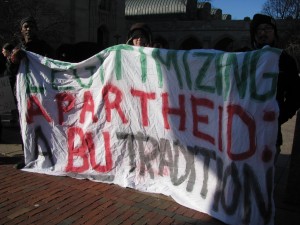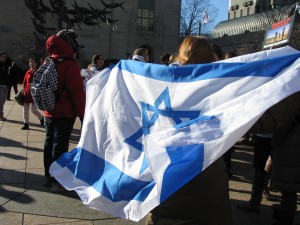
The first week of March marked Israeli Apartheid Week in Boston. Boston University’s chapter of Students for Justice in Palestine (SJP) planned several events that drew attention to the conditions Palestinians endure as they work to exist alongside Israel. SJP had originally planned on showing a movie to bring attention to the issue of Israeli Apartheid, but when they couldn’t secure the rights to the movie and BU Students for Israel (BUSI) warned SJP against rumored protests, SJP had a change of heart.
When BUSI heard through the grapevine that SJP was planning on constructing a mock Apartheid wall – which SJP claims it originally had no plans to do – BUSI felt the need to contact SJP to warn them against “misrepresenting” and “sensationalizing” the issue of Israeli Apartheid, according to BUSI President Rachelle Rubin (CAS ’12). Rubin was careful, both in the e-mail and in a subsequent interview, to clarify that “we [BUSI] don’t demand anything.” However, active SJP member Luke Rebecchio (CAS ’14) said that just “the fact that the letter was sent, we viewed it somewhat as a threat.”
In response to that perceived threat, and SJP decided to shift gears and hold the mock Apartheid wall protest despite BUSI’s request for them to eliminate the idea. The protest was held both on Tuesday and Thursday of Apartheid week. Members of SJP stood on Commonwealth Ave outside of Marsh Plaza holding up eight-foot-high styrofoam boards that had been painted to resemble parts of the wall, built by Israel, that separates the West Bank from Israel.
On Thursday, in addition to the SJP members carrying their mock wall, members of BUSI were holding a counterprotest on Marsh Plaza. According to Rubin, members of BUSI sang songs and observed a moment of silence for all those who have lost their lives in the Israeli-Palestinian conflict. Rubin also spoke at the event, calling for “peaceful dialogue,” while still lamenting the fact that SJP was “sensationalizing” the issue. For their part, SJP felt that far from sensationalizing the barrier, their mock wall fell far short of the reality.
“If we really wanted to show the wall it would be three times as high as that and it would be equipped with snipers,” Rebecchio said in response to BUSI’s charges. “We’re just trying to let people know about the situation and what students can do about it.”

It is hardly surprising, given these groups’ apparent penchant for antagonizing each other, that BUSI dismissed SJP’s aim to educate the student body. Rubin said that the wall was not the best way to communicate with students, and that it made some observers “extremely intimidated in a very real sense.” Rubin added that perhaps debate would be a better way to educate the student body.
Debate, believe it or not, is the one thing that BUSI and SJP can agree on. According to Rebecchio, a debate is something SJP “would be willing to do.”
Despite the fact that both groups support the final goal of a two state solution – SJP member Tyler Cullis (LAW ’13) said he “[agrees] with the rest of the world” in supporting a two-state solution, while Rubin stated that BUSI was willing to “acknowledge that Palestinians need a state of their own’ – it doesn’t look like BU can get its hopes up for what could be a truly fantastic campus event.
When asked if there was any communication between the groups, Rebecchio said “Occasionally they send spies into our meetings – I don’t know if that counts as dialogue though.” Rubin made no reference to BUSI spies, but echoed the sentiment of a lack of communication, saying that BUSI “has made many efforts to open those lines [of communication], but they have not been opened.”
Both groups have prior conditions they feel must be met before talks for a debate could commence. True to the pattern of the larger Israeli-Palestinian conflict, it seems unlikely that either group will ever agree to the demands of the other.
According to Rebecchio, SJP would require BUSI to “recognize that the conditions in Israel constitute Apartheid, that the actions of the Israeli government constitute ethnic cleansing” before they would be willing to sit down to talks.
For her part, Rubin made it clear that BUSI would sit down with SJP “only with the acknowledgement that Israel has the right to exist and has a right to defend herself.”
Since BUSI views part of Israel’s right to defend itself as the right to build the wall that SJP protests, it seems highly unlikely that SJP will acquiesce to those conditions. Similarly, BUSI’s insistence that the barrier serves to protect Israel and Israeli citizens from suicide bombers and that it is essential to Israel’s security makes the thought of an acknowledgement that the wall represents Apartheid laughable.
To the BU students who wish our campus were more politically active (and let’s face it, any political activity at all would be more than we are used to) these protests seemed like a blessing at first. Large numbers of people came to a fairly well publicized protest in a very public place to stand up for what was important to them. What is frustrating is that BUSI and SJP can’t put aside their animosity and have a conversation. Yes, both groups are open to talking, but only with preconditions that are unlikely to ever be met. Institutions of higher learning should be places where the forum of ideas is open, even to those whose differences seem insurmountable. Maybe if we stuck BUSI and SJP in a room together they would yell themselves hoarse and nothing would have been accomplished. But maybe they would yell at each other for a while, and then get bored and talk. With such a contentious issue and so many passionate people it is hard to imagine that a debate could result in anything but a better understanding.


Typical control tactics by you know who.
Time is running out for Isreal.
One state, all return just like in South Africa